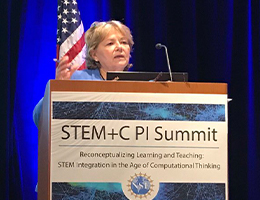NSF, EDC Lead Summit to “Reconceptualize Learning and Thinking”
To thrive in the 21st century workforce, all students will need strong STEM and computational thinking skills. How will K–12 education need to change to make sure students have these skills?
On September 18–20, over 200 researchers and educators funded by the National Science Foundation (NSF) STEM + Computing K–12 Education (STEM+C) program met in Alexandria, VA to examine this question. Led by the NSF, and co-chaired and hosted by EDC’s Joyce Malyn-Smith and Sarita Pillai, the “Reconceptualizing Learning and Teaching Summit” spotlighted the STEM+C program’s impacts and engaged participants in discussing the future of education.
“The summit was a real collaboration between NSF leaders and the STEM+C community,” said Malyn-Smith, an EDC distinguished scholar and advisor. “Researchers and program officers dug deeply into findings on effective strategies to help teachers use STEM+C to excite and inspire students, build students’ problem-solving skills, and prepare students for any career they wish to pursue.”
A few highlights from the summit follow:
- Sessions by over 60 STEM+C researchers from across the United States who shared findings on a wide range of topics, including agriculture and computer science, programming for students who are visually impaired, and equitable access to high-quality STEM+C learning
- Presentations by NSF leaders Sylvia James, Karen Marrongelle, and Arlene de Strulle (STEM+C program lead)
- A keynote panel, “International, Statewide, and Local STEM+C Impacts,” that featured Heidi Schweingruber, Stefania Bocconi, Lauren Birney, and Anne DeMallie
“I very much enjoyed the summit,” said Jessica F. Shumway, a STEM+C project co-principal investigator, assistant professor at Utah State University, and author of the Number Sense Routines series. “It has been a fabulous learning and thinking experience.”
